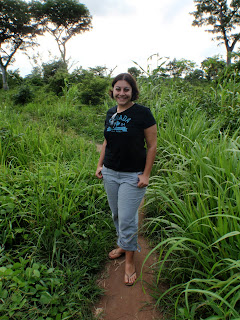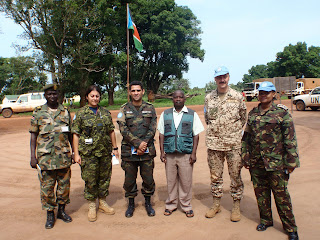UNMIS mission status. The UNMIS mandate ended 9 July 2011 with the secession of South Sudan from the Republic of Sudan South Sudan ) has now begun and we are firmly into a transition period, working to attain the new organizational structure and implement the new mandate. Information received has been slow, incomplete and often contradictory. Everyone is doing the best they can with the pieces of the puzzle that they control.
Now, what does this mean for the people of South Sudan ? The new mission falls under Chapter VII of the UN Charter, as opposed to the Chapter VI mandate of UNMIS. Hopefully the new mandate will prove to be more robust and allow increased protection of civilians. The international community is not abandoning the people of South Sudan .
Personnel are redeploying from the northern sectors to the south ensuring that the South Sudanese have the support they require to successfully develop into a prosperous, secure, and peaceful nation. There are many advisory roles in the new mission for both the police and military who will impart lessons learned to the world’s youngest country through engagement in training, education, and joint patrols.
Personnel are redeploying from the northern sectors to the south ensuring that the South Sudanese have the support they require to successfully develop into a prosperous, secure, and peaceful nation. There are many advisory roles in the new mission for both the police and military who will impart lessons learned to the world’s youngest country through engagement in training, education, and joint patrols.
What does it mean for my team site? From 7 – 13 July we were in a holding pattern with patrols halted while we waited for orders on how to implement the new mandate. We received interim direction to resume town patrols and simply increase their distance to show continued UN presence.
And so, on 15 July 2011, after a week without patrolling, I had the pleasure of being patrol leader for a UN presence patrol to NZARA. We did not meet any leadership or discuss the security situation; instead we stopped and talked with many locals, shook hands, waved, and handed out candy to the children. It was great to be back out on the ground. I hope it provided a measure of reassurance to the local population, demonstrating the international community's commitment to a continued presence in
What does this mean for me? Well, my time here will come to a close sooner than I had expected and hoped. My end of mission, 21 Aug 2011 has now been changed to 31 July 2011. This final date will affect me and about 500 others since there are no positions for Capt UNMOs in the new mission. The military component will consist of Maj and LCol Military Advisors and Staff Officers (SOs). A separate mission in ABYEI (UNISFA) will continue to employ Capts as UNMOs and SOs. Many of my colleagues will be redeployed to other UN missions including MONUC (DRC), UNAMID (Darfur ), UNISFA, etc. The rest of us are leaving a few weeks early. This means that over the next two weeks I will leave for JUBA and Khartoum for my checkout, and then back to Canada
Ok, now back to the good stuff! I need to get caught up with all my patrol updates so that I can write about the festivities of July 9th!
27-29 June 2011, Long Duration Patrol (LDP) to EZO, a distance of 155 km and a four hour drive.
On LDP we conduct a road move to our Temporary Operating Base (TOB) and proceeded with daily patrols from that location. For this LDP County Support Base (CSB) EZO was our TOB.
We departed YAMBIO late, as we waited for UNHCR (United Nations High Commissioner for Refugees) personnel to arrive from
We moved ahead quite jerkily, practically stalling, as the driver of our lead vehicle seemingly learned how to drive while simultaneously attempting to overcome his fear of oncoming traffic (perhaps the best strategy is not to slam on your breaks in the middle of the road when a high speed vehicle is approaching). I was driver of vehicle 2. It was both hilarious and frustrating to experience this road move as we were on a beautiful main road yet failed to exceed 60 km/h.
Clearly, a few issues were unavoidable as we did have some bad weather with near zero visibility downpours where we struggled to crawl out of first gear.
We eventually arrived as night fell and set up camp in a sketchy building from the 1940s.
At least we have a roof over our heads -- barely.
 |
| There was no running water. The red bucket on the right is used to flush the toilet. |
 |
| The back patio. My favourite spot in Ezo! |
 |
| It was an interesting shower experience! |
28 June 2011, patrol to BAGIDI, 31 km from EZO and a two hour and ten minute drive.
I was the driver for the Patrol Leader, an Egyptian LCol (the first UNMO car always has the patrol leader in it), our South Sudanese Language Assistant, and a Dutch UNPOL (United Nations Police). The drive was hilarious! My Egyptian friend is definitely not used to being driven around by a woman; this proved to be frustrating and hilarious at times! Many of the locals appeared to enjoy seeing me chauffeur the men, often doing double takes to ensure they had seen properly!
The road was incredibly rocky and bumpy; thanks to a healthy dose of rain, there were also some fun mud holes to play in!
None of this helped to ease my Egyptian colleague’s nerves, as we both had very different obstacle avoidance strategies in mind!
I must also confess that since I was a bit bored I wanted to have a little fun while driving. The result was priceless!
 |
| This was actually a section of the road! Seriously, so fun! |
Upon arrival in BAGIDI, we were told that a local headman had passed away and all the villagers were at the funeral -- an unavoidable complication in an area with no communication network, so we were unable to call ahead to arrange the meeting.
The only person available in the payam was a middle aged, drunken man.
 |
| The BAGIDI police station and a policeman! |
 |
| A quick stop in the BAGIDI jail for us! |
After an entertaining, if not completely unfruitful meeting, we headed back to EZO, stopping along the way at the UPDF (Uganda People’s Defence Force) camp where we climbed the hill to discuss the security situation in the area with their commander.
Then we met with the EZO Commissioner and discussed the county’s itinerary for the secession celebrations.
They had an exciting schedule of events planned, which he eagerly shared with us.
 |
| Dennis, our Dutch UNPOL was the all powerful banker and Wael, our Egyptian Patrol Leader enjoyed watching us play! |
29 June 2011, patrol to NAANDI, meeting with EZO SPLA Commander and return to YAMBIO TS.
We began the day with a brief visit to the EZO SPLA (Sudan People’s Liberation Army) camp where we discussed the situation on the ground and the security preparations for the 9 July celebrations.
Officials here had been extensively coordinating with the local SSPS (South Sudan Police Service) and military forces from neighbouring countries. EZO is on the border of the DRC (Democratic Republic of Congo) and CAR (Central African Republic
It was exciting to cross the border into three distinct countries while simply travelling around the market and town!
We then met up with our convoy and headed back to YAMBIO.
On the way back, we stopped at NAANDI Payam, an hour outside of EZO, and conducted an informative meeting where we acquired information regarding the Home Guard (Arrow Boys) organizational structure as well as
continued issues with boreholes, lack of food, lack of teachers, and lack of medical facilities and supplies throughout the payam.
The road move continued from this point, breaking one further time to partake in the hospitality of our Bangladeshi Force Protection, who had made a lunch of spicy rice and beef -- yum! We arrived at the team site in time for our 1500 hrs daily briefing.
As an aside for those of you with enquiring minds -- I have finally perfected the art of peeing in an African toilet (hole in the ground).
I discovered this exciting fact when I encountered an especially small toilet hole in NAANDI. I had to psych myself up a bit for this new challenge, but I was successful! What a feeling of accomplishment.
There are many variables that you must contend with when using an African toilet including, but certainly not limited to: trajectory, velocity, creatures, bugs, and stance. You have to weigh the pros and cons of keeping the door open and having some light, against the desire for moderate privacy and being in the dark with many random creatures. You must also remember the intense heat and corresponding smells that accompany such close quarters.
 |
| Dislaimer: this is not the actual toilet in NAANDI. This toilet is in LI RANGU, but it gives the general idea! |
I discovered this exciting fact when I encountered an especially small toilet hole in NAANDI. I had to psych myself up a bit for this new challenge, but I was successful! What a feeling of accomplishment.
There are many variables that you must contend with when using an African toilet including, but certainly not limited to: trajectory, velocity, creatures, bugs, and stance. You have to weigh the pros and cons of keeping the door open and having some light, against the desire for moderate privacy and being in the dark with many random creatures. You must also remember the intense heat and corresponding smells that accompany such close quarters.
Hands down my preferred health break location is in the woods; however, this scenario also holds a host of complications: animals, locals, spiders, bugs, dangerous plants, etc. I keep a whistle around my neck, just in case I need reinforcements from my colleagues at an inopportune moment! I must also thank the CF for sending me in green CADPAT (Canadian Disruptive Pattern camouflage uniform). This is the one and only time I am thanking them for this, as it helps camouflage me while using the washroom in the woods!



















No comments:
Post a Comment